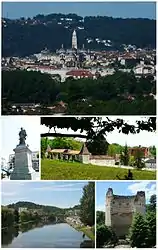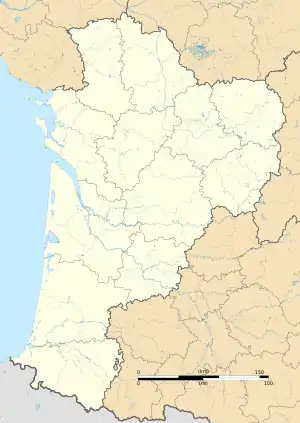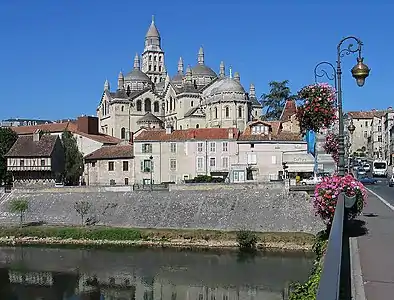Périgueux
Périgueux (/ˌpɛrɪˈɡɜː/, French: [peʁiɡø] ⓘ; Occitan: Peireguers [pejɾeˈɣɥes; pejɾeˈɡœː] or Periguers [peɾiˈɣɥes; peɾiˈɡœː])[lower-alpha 1] is a commune in the Dordogne department, in the administrative region of Nouvelle-Aquitaine, southwestern France.
Périgueux
| |
|---|---|
Prefecture and commune | |
 Top: Panorama view of Saint-Front Cathedral in Trélissac Hills, Middle left: Statue of Thomas-Robert Bugeaud in Bugeaud Square, Middle right: Barbadeau Castle (Le château de Barbadeau), Bottom left: Isle River and Saint Georges Bridge (Pont Saint Georges), Bottom right: The tower of Vésone (La tour de Vésone) | |
.svg.png.webp) Coat of arms | |
Location of Périgueux | |
 Périgueux  Périgueux | |
| Coordinates: 45°11′34″N 0°43′18″E | |
| Country | France |
| Region | Nouvelle-Aquitaine |
| Department | Dordogne |
| Arrondissement | Périgueux |
| Canton | Périgueux-1 and 2 |
| Intercommunality | Le Grand Périgueux |
| Government | |
| • Mayor (2020–2026) | Delphine Labails[1] |
| Area 1 | 9.82 km2 (3.79 sq mi) |
| • Urban | 154.4 km2 (59.6 sq mi) |
| • Metro | 1,061 km2 (410 sq mi) |
| Population | 29,255 |
| • Density | 3,000/km2 (7,700/sq mi) |
| • Urban (2018[3]) | 65,341 |
| • Urban density | 420/km2 (1,100/sq mi) |
| • Metro (2018[3]) | 113,384 |
| • Metro density | 110/km2 (280/sq mi) |
| Time zone | UTC+01:00 (CET) |
| • Summer (DST) | UTC+02:00 (CEST) |
| INSEE/Postal code | 24322 /24000 |
| Elevation | 75–189 m (246–620 ft) (avg. 101 m or 331 ft) |
| 1 French Land Register data, which excludes lakes, ponds, glaciers > 1 km2 (0.386 sq mi or 247 acres) and river estuaries. | |
Périgueux is the prefecture of Dordogne, and the capital city of Périgord. It is also the seat of a Roman Catholic diocese.
History
The name Périgueux comes from Petrocorii, a Latinization of Celtic words meaning "the four tribes" – the Gallic people that held the area before the Roman conquest. Périgueux was their capital city. In 200 BC, the Petrocorii came from the north and settled at Périgueux and established an encampment at La Boissière. After the Roman invasion, they left this post and established themselves on the plain of L'Isle, and the town of Vesunna was created. This Roman city was eventually embellished with amenities such as temples, baths, amphitheatres, and a forum. At the end of the third century AD, the Roman city was surrounded by ramparts, and the town took the name of Civitas Petrocoriorum.
In the 10th century, Le Puy-Saint-Front was constructed around an abbey next to the old Gallo-Roman city. It was organised into a municipality around 1182.
During the year 1940, many Jews from Alsace and Alsatians were evacuated to Périgueux.
Simone Mareuil (a lead actress from the surrealist film Un Chien Andalou) committed self-immolation on 24 October 1954 by dousing herself in gasoline and burning herself to death in a public square in Périgueux.
Geography
The Isle flows through Périgueux.
Demographics
In 2018, 30,060 people lived in the town, while its metropolitan area had a population of 113,384.[3]
|
| ||||||||||||||||||||||||||||||||||||||||||||||||||||||||||||||||||||||||||||||||||||||||||||||||||||||||||||||||||
| Source: EHESS[4] and INSEE (1968–2017)[5] | |||||||||||||||||||||||||||||||||||||||||||||||||||||||||||||||||||||||||||||||||||||||||||||||||||||||||||||||||||
Sights
Sights include: the remains of a Roman amphitheatre (known locally as the arènes romaines) the centre of which has been turned into a green park with a water fountain; the remains of a temple of the Gallic goddess "Vesunna"; and a luxurious Roman villa, called the "Domus of Vesunna", built around a garden courtyard surrounded by a colonnaded peristyle now housed in the Vesunna Gallo-Roman Museum.


Cathedral


The cathedral of St Front was built after 1120 and restored in the 19th century.
The history of the church of St Front of Périgueux has given rise to numerous discussions between archaeologists. Félix de Verneihl claims that St Front's was a copy of St Mark's Basilica in Venice; Quicherat, that it was copied from the church of the Holy Apostles of Constantinople. M. Brutails is of the opinion that even if the style of St Front's reveals an imitation of Oriental art, the construction differs altogether from Byzantine methods. The dates 984–1047, often given for the erection of St Front's, he considers too early; he thinks that the present church of St Front was built about 1120–1173, in imitation of a foreign monument by a native local school of architecture which erected the other domed buildings in the south-west of France.
The local architect, Paul Abadie (1812–1884), was responsible for radical changes to St Front's which are no longer appreciated by architects or local residents who prefer the purer Romanesque church of Saint-Étienne de la Cité, the former Cathedral of Périgueux.
The cathedral is part of the World Heritage Sites of the Routes of Santiago de Compostela in France.
Transport
Périgueux railway station offers connections to Limoges, Bordeaux, Brive-la-Gaillarde, and other regional destinations. The trains are operated by train company SNCF.
Climate
Périgueux has an oceanic climate (Köppen Cfb) with warm to hot summers combined with cool to mild winters. Périgueux has a mild climate for its latitude and inland position due to the significant Gulf Stream influence on the Bay of Biscay to its west. The resulting maritime air warms winters up, while at the same time it is far enough inland to cause warm summers on average.
| Climate data for Périgueux (1981–2010 normals; extremes 1973–2017) | |||||||||||||
|---|---|---|---|---|---|---|---|---|---|---|---|---|---|
| Month | Jan | Feb | Mar | Apr | May | Jun | Jul | Aug | Sep | Oct | Nov | Dec | Year |
| Record high °C (°F) | 18.5 (65.3) |
23.1 (73.6) |
27.6 (81.7) |
29.3 (84.7) |
32.0 (89.6) |
38.1 (100.6) |
38.0 (100.4) |
40.0 (104.0) |
36.1 (97.0) |
31.1 (88.0) |
23.9 (75.0) |
19.1 (66.4) |
40.0 (104.0) |
| Average high °C (°F) | 8.9 (48.0) |
10.4 (50.7) |
14.4 (57.9) |
16.9 (62.4) |
20.8 (69.4) |
24.0 (75.2) |
27.0 (80.6) |
27.2 (81.0) |
24.0 (75.2) |
18.8 (65.8) |
12.9 (55.2) |
9.7 (49.5) |
17.7 (63.9) |
| Daily mean °C (°F) | 5.1 (41.2) |
5.9 (42.6) |
8.9 (48.0) |
11.2 (52.2) |
15.0 (59.0) |
18.1 (64.6) |
20.6 (69.1) |
20.5 (68.9) |
17.4 (63.3) |
13.6 (56.5) |
8.7 (47.7) |
5.6 (42.1) |
12.4 (54.3) |
| Average low °C (°F) | 1.1 (34.0) |
1.4 (34.5) |
3.4 (38.1) |
5.5 (41.9) |
9.2 (48.6) |
12.2 (54.0) |
14.3 (57.7) |
13.8 (56.8) |
10.7 (51.3) |
8.3 (46.9) |
4.5 (40.1) |
1.6 (34.9) |
7.0 (44.6) |
| Record low °C (°F) | −17.5 (0.5) |
−13.7 (7.3) |
−15.1 (4.8) |
−5.0 (23.0) |
−2.0 (28.4) |
1.0 (33.8) |
5.0 (41.0) |
1.8 (35.2) |
0.0 (32.0) |
−3.3 (26.1) |
−9.2 (15.4) |
−12.0 (10.4) |
−17.5 (0.5) |
| Average precipitation mm (inches) | 83.9 (3.30) |
65.3 (2.57) |
70.4 (2.77) |
81.1 (3.19) |
81.2 (3.20) |
73.8 (2.91) |
71.4 (2.81) |
65.3 (2.57) |
53.9 (2.12) |
74.3 (2.93) |
81.0 (3.19) |
68.9 (2.71) |
874.9 (34.44) |
| Average precipitation days | 12.4 | 10.6 | 11.1 | 10.6 | 11.2 | 9.3 | 6.4 | 6.0 | 6.5 | 9.5 | 11.7 | 10.5 | 115.8 |
| Source 1: Météo Climat[6] | |||||||||||||
| Source 2: Météo Climat[7] | |||||||||||||
Personalities
Périgueux was the birthplace of:
- Pierre Daumesnil (1776–1832), general of the First Empire.
- Georges Bégué (1911–1993), engineer and agent in the Special Operations Executive
- Francine Benoît (1894–1990), composer, music critic and teacher, who gained Portuguese citizenship in 1929. She taught pianist Maria João Pires and composer Emanuel Nunes, amongst others.
- William Joseph Chaminade (1761–1850), founder of the Society of Mary (Marianists) and the Daughters of Mary Immaculate
- Patrick Ollier (1944–), politician, President of the National Assembly in 2007.
- Jean Clédat (1871–1943), Egyptologist, archaeologist and philologist.
- Ketty Kerviel (1916–2009), film actress
- Nicole Duclos born Salavert (1947–), athlete.
- Rachilde (1860–1953), writer associated with the Decadent and Symbolist movements.
- Julien Dupuy (1983–), rugby union player.
- Greg Mathias (1967–), artist and sculptor, member of the Neo Cubist school of art.
- René Thomas (1886–1975), racing driver, winner of the Indianapolis 500 in 1914.
Notes
- Transcriptions represent both Languedocien and Limousin pronunciation.
References
- "Répertoire national des élus: les maires" (in French). data.gouv.fr, Plateforme ouverte des données publiques françaises. 13 September 2022.
- "Populations légales 2020". The National Institute of Statistics and Economic Studies. 29 December 2022.
- Comparateur de territoire, INSEE, retrieved 20 June 2022.
- Des villages de Cassini aux communes d'aujourd'hui: Commune data sheet Périgueux, EHESS (in French).
- Population en historique depuis 1968, INSEE
- "French climate normals 1981–2010". Météo Climat. Retrieved 19 September 2018.
- "Périgueux weather extremes". Météo Climat. Retrieved 19 September 2018.
- "National Commission for Decentralised cooperation". Délégation pour l’Action Extérieure des Collectivités Territoriales (Ministère des Affaires étrangères) (in French). Archived from the original on 8 October 2013. Retrieved 26 December 2013.
External links
 This article incorporates text from a publication now in the public domain: Herbermann, Charles, ed. (1913). Catholic Encyclopedia. New York: Robert Appleton Company.
This article incorporates text from a publication now in the public domain: Herbermann, Charles, ed. (1913). Catholic Encyclopedia. New York: Robert Appleton Company. {{cite encyclopedia}}: Missing or empty|title=(help)- (in French) City council of Périgueux
- (in French) reports on culture and people in Périgueux
- (in French) Web site of the Périgord
- (in French) Perigueux-city.com
